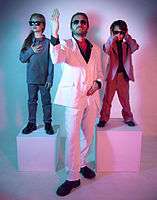DMK (band)
| DMK | |
|---|---|
|
DMK, 2012. Milah Schrader (left), Dicken Schrader (center), Korben Schrader (right). | |
| Background information | |
| Origin | Bogotá, Colombia |
| Genres | Synthpop |
| Years active | 2010–present |
| Website |
facebook |
| Members |
Dicken Schrader Milah Schrader Korben Schrader |
DMK is a Depeche Mode cover band formed in 2010 in Bogotá, Colombia, featuring Dicken Schrader (lead vocals, keyboard, xylophone, ukulele, percussion), his daughter Milah Schrader (background vocals, recorder, melodica, ukulele, percussion) and his son Korben Schrader (background vocals, toy keyboard, xylophone, toy accordion, percussion). DMK is noted for crudely emulating the sounds of Depeche Mode using an old keyboard and various toys and household items as instruments. The band became an instant internet sensation in January, 2012, following the release of their third cover video, "Everything Counts," and since then it has been featured in blog entries by Perez Hilton[1] and Oprah Winfrey [2] and in news reports worldwide by CBS News,[3] The Huffington Post,[4][5] SkyNews,[6] The Guardian,[7] Wired Magazine[8] and many more.[9][10][11][12][13][14] The band was featured in MTV Iggy's "10 Colombian bands on the rise" article,[15] by JetSet Magazine as the most famous Colombians in YouTube,[16] and their remake of “Everything Counts” has been selected by Electronic Beats magazine as one of the ten best Depeche Mode covers ever.[17] Since their online success, DMK has been invited to perform in front of live audiences in Colombia,[18][19][20] the United States,[21] Spain[22][23] and Poland. [24][25][26][27][28]
History
Formation (2010–2012)
DMK's origins date to September 2010, when Dicken Schrader decided to record himself performing "Shake The Disease" by Depeche Mode, his favorite group since he was in his teens. The song was released via YouTube with a video in which he appeared to play simultaneously a series of instruments, toys and recycled materials, recreating with them very crudely the industrial sounds of the 1985 classic. But the most outstanding feature of this video, and the one that would spark an unexpected viral phenomenon, was the inclusion of Schrader’s children, who reproduced alongside their father some of the sounds that make up the song. Back then Milah and Korben, who were just 7 and 4 years old respectively, already displayed not only great interest in music but also amazing talents in learning and performing it. This fact, on top of the positive feedback from the few people who saw the video, encouraged them to create not just one, but a series of Depeche Mode covers that would document the kids’ growth in stature and music virtuosity throughout the years. Something to entertain friends and family.[29] Their second cover, "Strangelove," was released in July, 2011.
Everything Counts (2012)

With the release of their third cover, “Everything Counts,” in December, 2011, the trio inadvertently attracted the attention of a much larger audience. The video was featured in popular blogs, newscasts, radio stations and media outlets all over the world, and in a matter of weeks it easily amassed a million hits on YouTube. This sudden popularity compelled the Schraders into forming DMK in February, 2012.[30][31][32][33][34][35][36][37][38][39][40][41][42] The name "DMK" comes from the initials of its members (Dicken, Milah and Korben) and also stands for "Depeche Mode Kids."[43] "Everything Counts" has become DMK’s most successful cover to date, collecting more hits in YouTube than the digitally re-mastered version of the original Depeche Mode song.[44]
Artistic Growth (2012–2015)
Since the release of "Everything Counts" the band has produced three more Depeche Mode covers: "Black Celebration," released in June, 2012, "Enjoy The Silence", released in December, 2012, and "Just Can't Get Enough", released only as a live version especially for the BAS 2013 festival in Basildon, UK in May, 2013. Since their online popularity exploded they have been invited to perform in front of live audiences, first in Colombia at events live the Festival Tecnológico Texun 2012 in Medellín [45] and the Fantástico! Festival Internacional de las Artes 2013 in Barranquilla,[46] and then abroad at events like the Échale Latino Music Estyles festival in San Antonio [47] and the ¡Pachanga! Latino Music Festival in Austin, Texas,[48] on May 9 and 10, 2014. They also headlined Sónar Kids in El Port de la Selva, Catalonia, on May 24 and 25, 2014, where they performed in front of a crowd of over 5000 people.[49][50][51] In December, 2014, DMK released their seventh cover video, "But Not Tonight," their first professionally made music video.[52] On March 13, 2015, DMK opened the second day of Festival Estéreo Picnic in their hometown of Bogotá.[53][54][55][56] The show was a success despite the fact that Korben broke his right elbow two days before the festival and had to play only with his left hand.[57][58] In May 2015, after 5 years of recording Depeche Mode covers, DMK releases their first original composition entitled "Pale Blue Dot," a homage to the famous photograph taken by the Voyager 1 space probe and, incidentally, by Carl Sagan's thoughts about it expressed on his book by the same name. They also announced that the kids would move with their mother to Miami, Florida, but that this separation would not break up the band.[59]
Videography
- Shake The Disease - DMK (2010)
- Strangelove - DMK (2011)
- Everything Counts - DMK (2011)
- Black Celebration - DMK (2012)
- Enjoy The Silence - DMK (2012)
- Just Can't Get Enough - DMK (2013)
- But Not Tonight - DMK (2014)
- Pale Blue Dot - DMK (2015)
References
- ↑ perezhilton.com
- ↑ oprah.com
- ↑ CBS News
- ↑ The Huffington Post
- ↑ The Huffington Post UK
- ↑ SkyNews
- ↑ The Guardian
- ↑ Wired news
- ↑ TheJournal.ie
- ↑ Jezebel.com
- ↑ Babble.com
- ↑ Babycenter.com
- ↑ Buzzsaw Magazine
- ↑ El Confidencial, Spain
- ↑ MTV Iggy
- ↑ JetSet Magazine
- ↑ Electronic Beats
- ↑ Festival Tecnológico Texun
- ↑ ¡Fantástico! Festival Internacional de las Artes
- ↑ Caracol Televisión, Colombia
- ↑ Telemundo, United States
- ↑ Europapress, Spain
- ↑ RTVE, Spain
- ↑ Spex, Germany
- ↑ Festivall, Poland
- ↑ Onet, Poland
- ↑ Now Ny Zabrzanskie, Poland
- ↑ Elle, Poland
- ↑ DMK Bio Page
- ↑ colombiareports.com
- ↑ Tiempo Real
- ↑ La Voz, Argentina
- ↑ designerdaddy.com
- ↑ Publimetro, Mexico
- ↑ La Reppublica, Italy
- ↑ Zero magazine, Sweden
- ↑ Diario La Nación, Costa Rica
- ↑ En Tic Confío, Colombia
- ↑ eNCA News, South Africa
- ↑ Revista Semana, Colombia
- ↑ Kölner Stadt-Anzeiger, Germany
- ↑ 20 Minuten, Switzerland
- ↑ Latin Post, United States
- ↑ SkyNews, UK
- ↑ Festival Tecnológico Texun
- ↑ Fantástico! Festival Internacional de las Artes
- ↑ Échale Latino Music Estyles
- ↑ ¡Pachanga! Latino Music Festival
- ↑ La Vanguardia, Spain
- ↑ El Diario, Spain
- ↑ Empordà, Catalonia
- ↑ Escena Indie.com, Colombia
- ↑ Confidencial Colombia, Colombia
- ↑ Club Social Music, Colombia
- ↑ Página 12, Argentina
- ↑ Rolling Stone Magazine, Colombia
- ↑ Revista Metrónomo, Colombia
- ↑ Escena Indie, Colombia
- ↑ Designer Daddy, U.S.A.
External links
- Tomomemitasha Dicken Schrader's YouTube Channel
- DMK DMK's Facebook band page
- YouTube video DMK: "Shake The Disease"
- YouTube video DMK: "Strangelove"
- YouTube video DMK: "Everything Counts"
- YouTube video DMK: "Black Celebration"
- YouTube video DMK: "Enjoy The Silence"
- YouTube video DMK: "Just Can't Get Enough"
- YouTube video DMK: "But Not Tonight"
- YouTube video DMK: "Pale Blue Dot"

